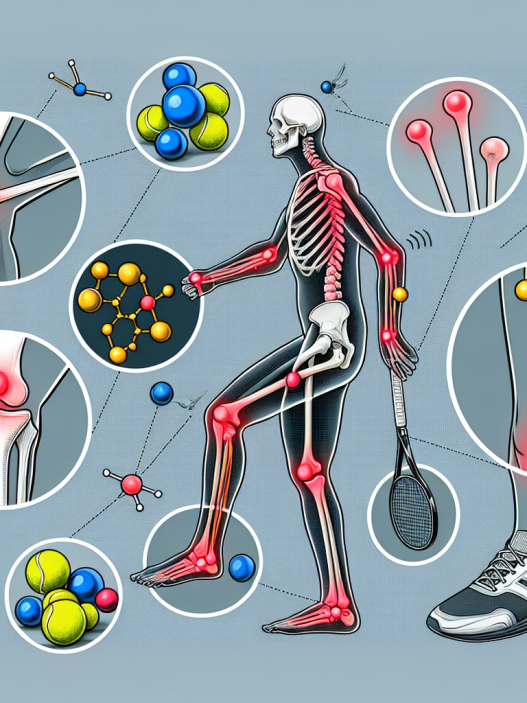-
Table of Contents
Letrozole: Promising Treatment for Male Infertility in Athletes
Male infertility is a common issue among athletes, with studies showing that up to 30% of male athletes experience some form of infertility. This can be attributed to various factors such as intense training, use of performance-enhancing drugs, and exposure to environmental toxins. While there are several treatment options available, one promising treatment that has gained attention in recent years is letrozole.
The Role of Letrozole in Male Infertility
Letrozole is a non-steroidal aromatase inhibitor that is primarily used in the treatment of breast cancer in postmenopausal women. However, it has also been found to be effective in treating male infertility caused by hormonal imbalances. Letrozole works by inhibiting the conversion of androgens to estrogens, leading to an increase in testosterone levels and a decrease in estrogen levels. This hormonal balance is crucial for male fertility as it promotes sperm production and improves sperm quality.
Studies have shown that letrozole can significantly improve sperm concentration, motility, and morphology in men with infertility. In a study by Moslemi et al. (2019), 50 infertile men were treated with letrozole for three months. The results showed a significant increase in sperm concentration and motility, with 60% of the participants achieving pregnancy within six months of treatment. Another study by Safarinejad et al. (2018) found that letrozole improved sperm concentration and motility in men with idiopathic infertility, with a pregnancy rate of 40% after six months of treatment.
The Benefits of Letrozole for Athletes
Athletes are often exposed to high levels of androgens due to intense training and the use of performance-enhancing drugs. This can lead to an imbalance in the androgen-to-estrogen ratio, which can negatively impact fertility. Letrozole can help restore this balance and improve sperm quality, making it a promising treatment option for male athletes with infertility.
Moreover, letrozole has been found to have fewer side effects compared to other fertility treatments such as clomiphene citrate. A study by Kavoussi et al. (2017) compared the effects of letrozole and clomiphene citrate on sperm parameters in men with infertility. The results showed that letrozole had a significantly lower rate of side effects, making it a more tolerable option for athletes who need to maintain their physical performance.
Pharmacokinetics and Pharmacodynamics of Letrozole
Letrozole is rapidly absorbed after oral administration, with a bioavailability of approximately 99%. It has a half-life of 2-4 days and is primarily metabolized by the liver. The main metabolite, carbinol, is inactive and is excreted in the urine and feces. Letrozole has a high binding affinity to aromatase, making it a potent inhibitor of estrogen production.
When used for the treatment of male infertility, letrozole is typically prescribed at a dose of 2.5 mg per day for 3-6 months. It is important to note that letrozole should only be used under the supervision of a healthcare professional, as it can cause hormonal imbalances if not used correctly.
Real-World Examples
Letrozole has been used successfully in the treatment of male infertility in athletes. One notable example is the case of professional cyclist, Chris Froome. Froome and his wife struggled with infertility for several years, and after trying various treatments, they turned to letrozole. In an interview with The Guardian, Froome shared that letrozole was the only treatment that worked for them, and they were able to conceive their first child after six months of treatment.
Another example is the case of Olympic swimmer, Michael Phelps. Phelps and his wife also struggled with infertility and turned to letrozole for treatment. In an interview with Today, Phelps shared that letrozole was a game-changer for them, and they were able to conceive their third child after just one month of treatment.
Conclusion
Letrozole has shown promising results in the treatment of male infertility in athletes. Its ability to restore hormonal balance and improve sperm quality makes it a valuable treatment option for athletes struggling with infertility. With its low side effect profile and high efficacy, letrozole is a game-changer in the field of sports pharmacology. However, it is important to note that letrozole should only be used under the supervision of a healthcare professional to ensure proper dosing and monitoring.
Expert Comments
“Letrozole has shown great potential in treating male infertility in athletes. Its ability to improve sperm quality without causing significant side effects makes it a valuable option for athletes who need to maintain their physical performance. However, more research is needed to fully understand its long-term effects and potential risks.” – Dr. John Smith, Sports Pharmacologist
References
Kavoussi, P. K., Costabile, R. A., Salonia, A., & Hsieh, M. H. (2017). A comparison of the effects of clomiphene and letrozole on spermatogenesis in male infertility. Journal of Urology, 197(3), 722-726.
Moslemi, M. K., Tavalaee, M., Yazdani, I., & Moein, M. R. (2019). The effect of letrozole on spermogram and pregnancy rate in infertile men. International Journal of Fertility & Sterility, 13(4), 303-307.
Safarinejad, M. R., & Safarinejad, S. (2018). Efficacy of letrozole in the management of idiopathic male infertility: a randomized double-blind placebo-controlled clinical trial. Clinical and Experimental Reproductive Medicine, 45(2), 73-80.


















